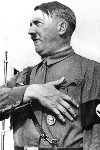The two 'Scraps of Paper'
The War Illustrated, Volume 1, No. 1, Page 25, September 16, 1939.
One scrap of paper’ brought Britain into the last war – A written engagement that Germany refused to believe that Britain would keep. Another, signed only in September, 1938, was the ‘No More War’ Anglo-German declaration, now thrown on to the scrap-heap of false hopes and broken promises.
On the evening of August 4, 1914, Germany’s Chancellor and Britain’s Ambassador in Berlin met at the Chancellery to discuss the situation which had arisen as the result of German violation of Belgian territory. German troops had crossed the frontier that very morning; Britain, true to her pledged word, had delivered what was in effect an ultimatum making it plain to the Imperial Government that unless they gave an assurance by 12 o’clock that night that they would proceed no farther with their violation of the Belgian frontier and stop[ the advance of their invading army, she would be forced to take such steps as her engagements required.
Herr von Bethmann Hollweg was agitated, even distraught. Sir Edward Goschen, too, was excited. Both felt themselves to be in the grip of a fastmoving fate. As soon as Goschen entered the Chancellery, the German Chancellor began a harangue which lasted for some twenty minutes. He said "that the step taken by the British Government was terrible; just a word, a mere word – neutrality’ a word which in war-time had so often been disregarded – just for a scrap of paper Great Britain was going to make war on a kindred nation who desired nothing better than to be friends with her".
For years, he continued, he had directed his policy towards a better understanding between Germany and Britain, and now everything "had tumbled down like a house of cards".
Sir Edward Goschen retorted that if the Chancellor wished him to understand that for strategical reasons it was a matter of life and death to Germany to advance through Belgium and so violate the latter’s neutrality, so it was a matter of life and death for the honor of Great Britain that she should keep her solemn engagement to do her utmost to defend Belgium’s neutrality if attacked. That solemn compact simply had to be kept, or what confidence could anyone have in engagements given by Great Britain in the future?
When Belgium Was Violated
There was no need to say what that "solemn compact" was. Bethmann Hollweg, from his long experience as German Chancellor, could not but be well aware of the existence of the Treaty of April 19, 1839, which establishing peace between Holland and Belgium, also declared Belgium’s status as an independent and permanently neutral kingdom. To that treaty were appended the signatures of the representatives of Great Britain, France, Prussia, Russia and Austria. By the very first article of the Treaty the five Powers guaranteed the neutrality of Belgium.
Signed and ratified in good faith, honorably maintained for three-quarters of a century, this was the pact which Bethmann Hollweg scornfully referred to as "a scrap of paper".
‘No More War’
During the Crisis of 1938, the first act in the tragic drama of Czecho-Slovakia’s down fall, Germany and Britain were once again within an ace of war, when for a space peace was saved. The Prime Minister came back from Munich, and as he issued from his ‘plane at Heston on September 30 he waved a piece of paper to the cheering crowd that greeted him. This paper bore the words: "We are resolved that the method of consultation shall be the method adopted to deal with any other questions that may concern our two countries, and we ware determined to continue our efforts to remove possible sources of difference and thus to contribute to assure the peace of Europe" and to it were attached the signatures of Adolf Hitler and Neville Chamberlain.
But after 1938 came 1939; after Munich, Prague; after Prague, Danzig...
And thus the "No More War" promise of September 1938 is just another scrap of paper. When shall the word of a German ever again be trusted?
Index
Previous article
Hitler's Six-year Campaign of Lies
No British statesman knows Hitler so well as Mr. Chamberlain, and we have it on his authority that Hitler’s "word is, for us, not worth the paper it is written on." Below are some of the most outsta
Next article
These Men Sought War
Adolf Hitler, born an Austrian, became the apostle of Pan-Germanism, Chancellor of the Reich since 1933 he has established his power on the doctrine of Mailed Fist. Party leader Rudolph Hess has fr




